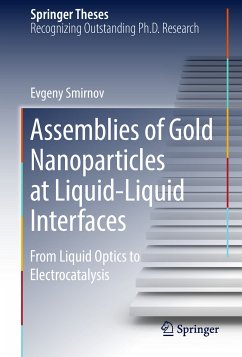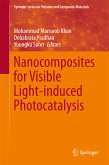This book is devoted to various aspects of self-assembly of gold nanoparticles at liquid-liquid interfaces and investigation of their properties. It covers primarily two large fields: (i) self-assembly of nanoparticles and optical properties of these assemblies; and (ii) the role of nanoparticles in redox electrocatalysis at liquid-liquid interfaces. The first part aroused from a long-lasting idea to manipulate adsorption of nanoparticles at liquid-liquid with an external electric field to form 'smart' mirrors and/or filters. Therefore, Chapters 3 to 5 are dedicated to explore fundamental aspects of charged nanoparticles self-assembly and to investigate optical properties (extinction and reflectance) in a through manner. Novel tetrathiafulvalene (TTF)-assisted method leads to self-assembly of nanoparticles into cm-scale nanofilms or, so-called, metal liquid-like droplets (MeLLDs) with remarkable optical properties. The second part (Chapters 6 to 8) clarifies the role of nanoparticles in interfacial electron transfer reactions. They demonstrate how nanoparticles are charged and discharged upon equilibration of Fermi levels with redox couples in solution and how it can be used to perform HER and ORR. Finally, chapter 9 gives a perspective outlook, including applications of suggested methods in fast, one-step preparation of colloidosomes, SERS substrates as well as pioneer studies on so-called Marangony-type shutters drive by the electric field.
Dieser Download kann aus rechtlichen Gründen nur mit Rechnungsadresse in A, B, BG, CY, CZ, D, DK, EW, E, FIN, F, GR, HR, H, IRL, I, LT, L, LR, M, NL, PL, P, R, S, SLO, SK ausgeliefert werden.









